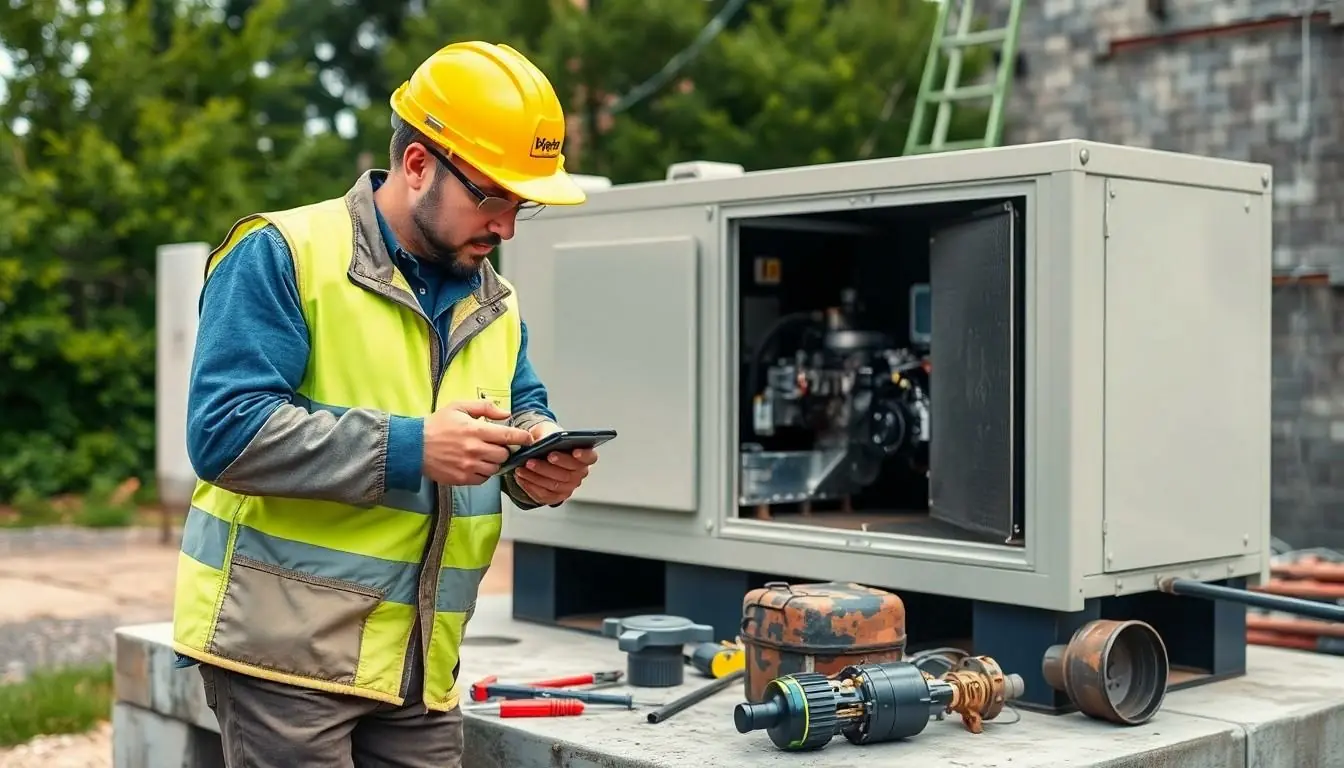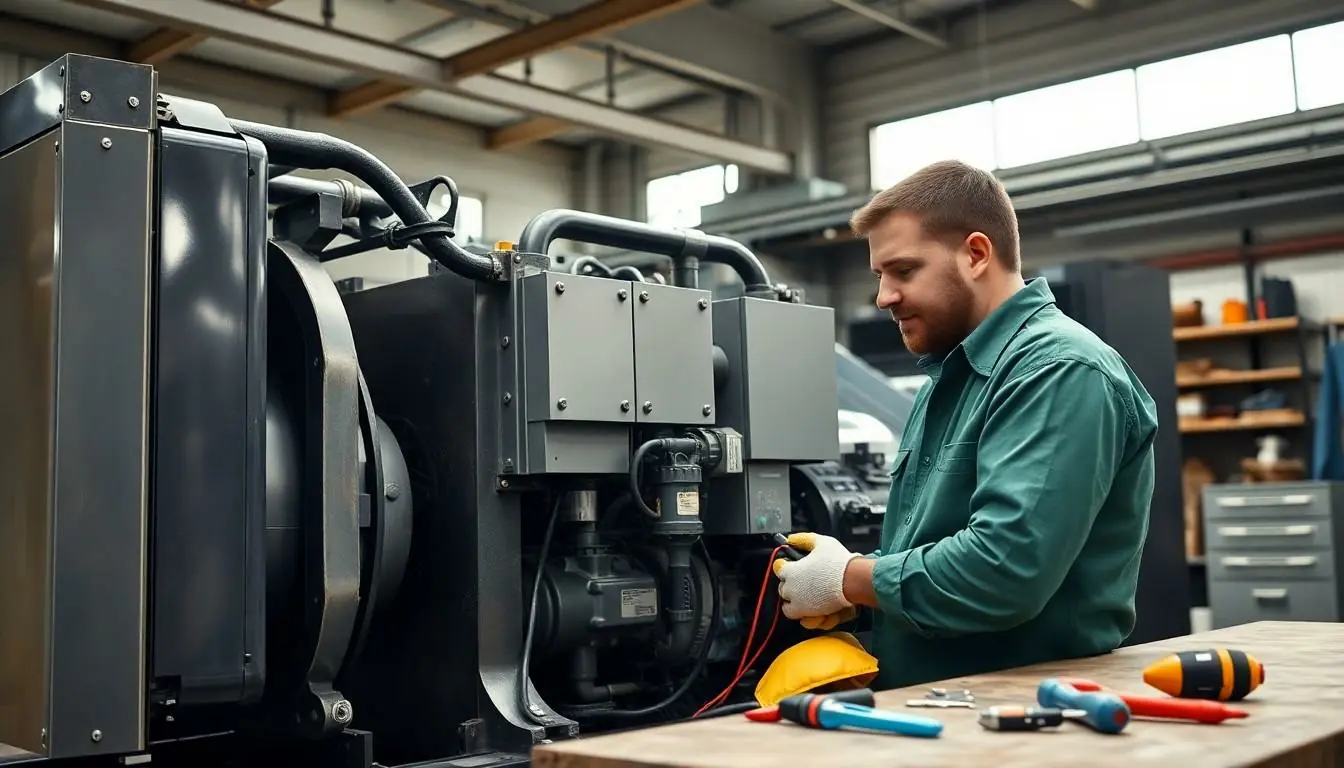Generators are like the unsung heroes of modern life, quietly powering our homes and businesses while we go about our daily routines. But what happens when these reliable workhorses start to sputter or, heaven forbid, go silent? That’s when generator repair and maintenance swoops in to save the day. Think of it as a spa day for your generator—because even machines deserve a little pampering.
Table of Contents
ToggleOverview of Generator Repair and Maintenance
Generators require regular maintenance to operate optimally. Essential tasks include oil changes, filter replacements, and fuel quality checks. Without routine attention, a generator may fail during critical moments.
Inspecting the battery and connections proves vital for reliable performance. Checking for corrosion and securing loose terminals enhances efficiency significantly. It’s important to clean the generator exterior to prevent dust accumulation that might affect airflow.
Regularly testing the generator under load confirms its ability to operate effectively. This process identifies issues, ensuring the unit meets power demands reliably. Conducting these tests twice a year is generally recommended for optimal safety.
Professional repair services offer expertise when problems arise. Skilled technicians can diagnose complex issues efficiently, minimizing downtime. Considering a maintenance contract could help maintain a generator’s health over time and reduce emergency repair costs.
Following the manufacturer’s guidelines ensures compliance with warranty requirements. Understanding specific maintenance schedules for different generator models is crucial. Keeping accurate records of repairs and servicing helps maintain the machine’s longevity.
Lastly, always prioritize safety when performing maintenance tasks. Disconnect the generator before beginning work and use appropriate personal protective equipment. This vigilance extends the life of the generator and provides peace of mind during use.
Common Generator Issues

Generators face various issues that can hinder their performance. Understanding these problems helps ensure efficient repair and maintenance.
Mechanical Problems
Mechanical problems often manifest in irregular sounds or vibrations. These signs indicate potential issues such as worn bearings or damaged components. Inspecting belts frequently reveals wear or misalignment affecting performance. Fuel delivery issues can arise from clogs in the fuel system, leading to inefficient operation. Checking oil levels is essential; low oil can cause overheating. Another common issue involves the cooling system, which may become obstructed, risking engine damage. Regular upkeep can prevent these mechanical failures and prolong generator life.
Electrical Problems
Electrical problems can lead to a complete generator shutdown. A common issue involves faulty wiring, which can create short circuits, risking damage to the generator. Loose connections often result in inconsistent electrical output. Voltage irregularities may occur due to failing voltage regulators, causing performance fluctuations. Battery issues also play a significant role; corrosion or low charge impacts starting ability. Regular checks of electrical components help ensure reliable performance and minimize disruptions.
Repair Techniques for Generators
Repair techniques for generators involve systematic approaches to identify and resolve issues. Accurate troubleshooting leads to effective solutions, enhancing the generator’s reliability.
Troubleshooting Steps
Start by inspecting fuel levels and ensuring the generator has adequate supply. Examine the battery for proper charge, as a weak battery can lead to starting difficulties. Check oil levels and look for leaks, which can indicate potential mechanical issues. Listen for unusual sounds, as they may signal internal problems. Confirm connections are secure, since loose wiring often causes inconsistent performance. If problems persist, consult the manufacturer’s manual for specific diagnostics tailored to the generator model.
Repair Tools and Equipment
Investing in essential tools optimizes generator repairs. Basic tools include socket sets, screwdrivers, and pliers, which facilitate most maintenance tasks. A multimeter helps diagnose electrical issues, allowing precise measurements of voltage and continuity. Oil filters and replacement parts should match manufacturer specifications for effective repairs. Utilizing a torque wrench ensures proper fittings during maintenance. Maintaining a clean workspace with adequate lighting improves safety and efficiency during repair processes.
Preventive Maintenance Practices
Preventive maintenance ensures generators operate efficiently and last longer. Regular tasks help identify potential issues before they escalate.
Regular Inspections
Inspecting generators regularly keeps systems running smoothly. Scheduling inspections every three months allows for early detection of problems, such as fluid leaks or worn parts. Checking battery connections and cable integrity prevents electrical failures. Attention to the fuel system ensures no clogs hinder performance. Observing unusual sounds during operation may indicate mechanical issues. Keeping a maintenance log provides a clear history of inspections and repairs. Each inspection reduces the risk of unexpected breakdowns and enhances generator reliability.
Cleaning and Lubrication
Cleaning the generator exterior improves cooling and prevents dust accumulation. Regularly wiping down surfaces minimizes corrosion and buildup. Lubricating moving parts enhances performance and reduces wear. Use the recommended oil for optimal results, checking levels frequently. Maintaining clean air filters maximizes airflow and improves efficiency. Cleaning fuel tanks removes sediment, ensuring clean fuel delivery. Dust and debris can obstruct filters, so routine checks are vital. Proper cleaning and lubrication practices significantly extend generator lifespan and functionality.
When to Seek Professional Help
Recognizing when to call in a professional for generator repair is crucial. Unusual sounds or vibrations that persist signal a potential issue requiring attention. If the generator fails to start after multiple attempts, it may indicate a deeper problem that needs expert evaluation.
Smoke or burning smells during operation often warrant immediate professional inspection. Electrical issues, such as constant shutdowns or unsteady output, can arise from faulty wiring or connections and must be addressed by trained technicians. Ongoing battery problems that lead to frequent replacements suggest a more significant electrical fault.
Complex repairs, especially those involving the fuel system or internal components, benefit from professional expertise. Technicians possess specialized tools and knowledge for diagnosing intricate issues beyond basic maintenance. Regular maintenance contracts provide peace of mind by ensuring generators receive periodic inspections to mitigate unexpected failures.
If troubleshooting attempts do not yield results, it’s time to consult a professional. Accurate diagnostics by an experienced technician can save time and reduce long-term repair costs. Additionally, any structural damage from external factors needs prompt professional assessment to ensure safety and compliance with regulations.
Adhering to manufacturer guidelines strengthens the case for professional help, especially when repairs fall outside owner capabilities. Seeking professional assistance guarantees that repairs meet safety standards and maintain the generator’s warranty. Regular documentation of all repairs conducted by experts supports its longevity. By prioritizing these conditions, owners can ensure their generators perform reliably for years to come.
Maintaining a generator is vital for ensuring its efficiency and longevity. Regular upkeep not only prevents unexpected breakdowns but also enhances overall performance. By following recommended maintenance practices and conducting routine inspections, generator owners can avoid costly repairs and ensure reliable power when needed most.
Seeking professional assistance for complex issues is crucial for addressing mechanical and electrical problems effectively. Staying proactive with maintenance and repairs ultimately leads to a more dependable generator. Adhering to manufacturer guidelines and keeping thorough records further supports the generator’s health, allowing it to serve its purpose reliably for years to come.





